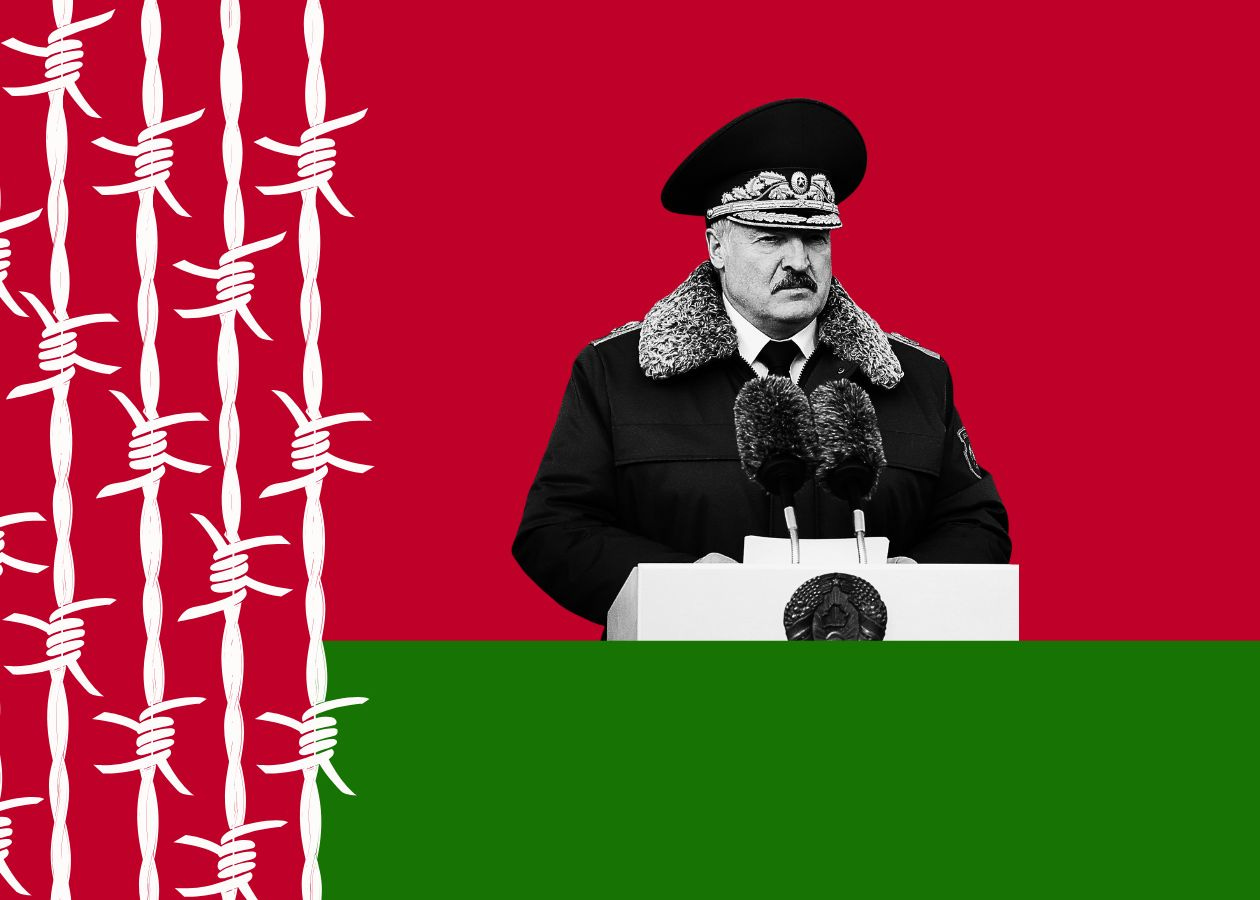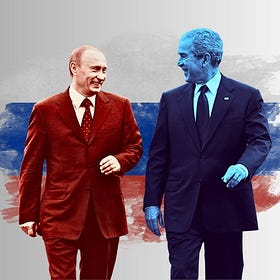A Cynical Game: How Belarus’s Pro-Russia Dictator Plays the West
Lukashenko is getting good press and sanctions relief. A Belarusian politician explains how the dictator does it—and how the Free World can stop losing.
EDITOR’S NOTE: Garry Kasparov is hosting an exclusive Zoom call to address the state of Americans’ First Amendment freedoms, this Thursday, September 25 at 12pm ET/9am PT. Space is limited in order to keep the discussion interactive. Don’t wait to sign up. Register here.
Andrei Sannikov is a Belarusian politician and activist living in exile. He served as deputy foreign minister of Belarus, later ran for president, and was held as a political prisoner. Mr. Sannikov is also a Frontline Fellow at Renew Democracy Initiative.
Earlier this month, Belarus released 52 political prisoners. Longtime Belarusian dictator Alexander Lukashenko framed the move as a gesture of goodwill, which occurred “at the request of President Trump.”
International headlines heralded the Belarusian regime’s action as liberatory. “Belarus frees 52 political prisoners,” (emphasis added) the Associated Press reported.
The reality was more complex. And “Belarus exiles political prisoners” would be a more appropriate description than “Belarus frees”.
Here’s what actually happened, and how Lukashenko—and Vladimir Putin—scored a triple victory: Good press, sanctions relief, and opening a backdoor for Russia into the West.
In the early hours of September 11, Belarusian political prisoners were extracted from penal colonies and detention facilities, hands often tied behind their backs with sacks or masks thrown over their heads. They were transported first to the capital, Minsk, then packed into minibuses and driven almost 100 miles to the Lithuanian border. There, they were forcefully deported, in many cases without passports or identification.
One detainee refused to comply. Opposition leader and former presidential candidate Nikolai Statkevich rejected forced exile, breaking open the bus door and stepping into the no man’s land between Belarus and Lithuania. After several hours, Belarusian security services removed him from the border area. Statkevich, imprisoned since June 2020, had spent over five years behind bars. For more than half of that time—31 months—he was held incommunicado.
Statkevich disappeared for several days after the confrontation on the border, and authorities provided no information regarding his whereabouts. A Belarusian news outlet claimed that he was returned to a penal colony, but Statkevich’s family says that they have no confirmation of his whereabouts and that there is reason to doubt unverified media reports. The opposition politician’s wife has received no response to a missing persons report that she filed after the incident at the border. Statkevich’s defiance highlights both his courage and the regime’s continued reliance on brutal repression as tools of control.
The plight of Belarusian political prisoners
The September release was the second such move linked to US pressure. Early in the summer, Lukashenko let out a smaller group of detainees.” Donald Trump initially demanded the release of 1,300 political prisoners, later raising the figure to 1,400.
Yet between the two releases, only 66 have been freed. At the current pace, the target will not be met within the US president’s term. Nevertheless, Donald Trump called Lukashenko a “highly respected President.”
The numbers significantly understate the scale of repression. Some independent estimates suggest that Belarusian security forces have made tens of thousands of political arrests in recent years. The human rights organization Vyasna (Spring) reports that while 170 prisoners were released between January and September 2025, 283 new individuals were arrested and sentenced on political charges during the same period.
The dynamic is clear: for every prisoner freed, more are detained.
Conditions inside Belarusian prisons remain severe. Testimonies from former detainees describe systematic torture, beatings, psychological abuse, and denial of medical care. Belarus has become, in effect, a vast system of political detention in the middle of Europe.
The regime’s repression at home is closely tied to its alignment with Russia’s regional aggression, making Belarus both a domestic and international security concern.
More from The Next Move:
Lukashenko’s cynical strategy
Lukashenko’s approach follows a consistent pattern: detain political opponents and civil society activists, then offer selective releases as bargaining chips in negotiations with the West.
The strategy is designed to extract concessions, particularly sanctions relief, while ensuring that the machinery of repression remains intact. His track record demonstrates that meaningful prisoner releases occur only under sustained external pressure, primarily in the form of meaningful sanctions.
However, recent US actions risk undermining this leverage. Despite the limited number of releases, Washington has already granted partial sanctions relief, including measures allowing Belarus’s national airline, Belavia, to procure spare parts for its fleet, including from American manufacturer Boeing.
This decision not only weakens the credibility of Washington’s stated benchmarks but also risks creating a sanctions loophole through which Russia could exploit to access aircraft and critical spare parts otherwise unavailable under Western restrictions.
The Belarusian government has been a co-belligerent in Russia’s war against Ukraine, yet the United States is now treating Minsk’s situation like a separate case.
While the humanitarian value of each release should not be minimized, policymakers must avoid conflating tactical concessions with strategic change. The deportation of 52 prisoners, while welcome, does not signal a shift in Minsk’s behavior. On the contrary, it reflects Lukashenko’s ability to manipulate negotiations through selective gestures while maintaining systemic repression.
What to do about Belarus?
For US and European policymakers, several lessons emerge:
First, Lukashenko’s behavior has consistently demonstrated that sanctions are the only effective leverage. His alleged “good will gesture” after talking to President Trump is nothing more than an attempt to get rid of sanctions. Weakening sanctions in exchange for limited releases incentivizes the regime to continue hostage bargaining.
Next, there is a need for the Western democracies to coordinate policy. Belarus exploits divisions between Washington and Brussels. Effective pressure requires alignment between US and EU measures, ensuring that Lukashenko cannot trade concessions from one side against the other. Of course, Trump may not want to align with the EU—in which case there is an even greater imperative for European countries to get on the same page.
That also means recognizing the regional dynamics at play. The internal repression the Belarusian regime carries out is directly linked to its role as a strategic partner for Russia. Weakening sanctions on the regime risks undermining broader efforts to isolate Moscow and constrain Russia’s military-industrial base.
Finally, Western policymakers need to set clear, human rights-oriented policies.
Vague targets allow Minsk to manipulate outcomes. Any negotiations should be tied to verifiable, comprehensive benchmarks, such as the release of all political prisoners and an end to politically motivated prosecutions, rather than incremental figures that Lukashenko can game.
Commercial incentives, such as the possibility of potash deals (according to some sources), must not outweigh the fundamental principle that human lives are not bargaining chips. Any agreement that strengthens the regime economically without systemic reform prolongs dictatorial rule and worsens the humanitarian situation.
In the short term, the release of 52 individuals has provided relief for their families and communities. In the long term, however, it underscores the continuing danger of Lukashenko’s regime. Without sustained and principled pressure, further repression is inevitable.
The international community must resist the illusion of progress and instead adopt a strategy that recognizes Lukashenko’s tactics for what they are: hostage-taking at the state level.
Anything less risks legitimizing the last dictatorship in Europe and undermining the broader struggle for security and democracy on the continent.
More from The Next Move:
The Russians Are Loving This
Charlie Kirk’s assassination and political violence in America have Russian propagandists downright giddy. It’s all fodder for a war being waged on social media.
America’s Biggest Post-9/11 Failure Is Not What You Think
US leaders made strategic errors dealing with Russia after September 11. Their mistakes have deadly echoes in the present.






"I know that these people are not the first and definitely not the last who choose to sell their conscience and legitimize the dictatorship regime by doing business in Belarus or visiting it as tourists. However, these stories stung me very deeply. Maybe because my family became refugees due to the fear of prosecution for their political views, while a rich, privileged guy says he doesn't have any. Maybe because my 85 y.o. Grandma, who lives in Belarus, whispers during our phone conversations, afraid of being eavesdropped. Maybe because this Christmas, I’ll be celebrating with my family in a tiny rental apartment in a foreign country far away from our home. My heart is split between Belarus, Ukraine, and the U.S., and these days, the combined pain feels unbearable."
https://daryazorka.substack.com/p/illusion-of-peace